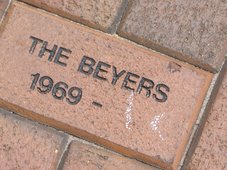Thursday, March 10, 2011
Banking on the community
The column originally ran in Capital Business, WaPo's new local business weekly:
By Dan Beyers
Monday, March 7, 2011; 15
Among community banks in the region, one in particular has seemed to shrug off the economic turbulence of recent years: Eagle Bancorp.
Where others reined in their ambitions, the Bethesda bank has been busy making loans, building its portfolio and racking up one record-breaking quarter after another. That kind of performance defies the current narrative on the financial industry, where supposedly the world is adjusting to the new normal.
Chairman, chief executive and president Ronald D. Paul claims the bank was just in the right place at the right time, small enough to be nimble when the downturn set in and big enough to make the sort of loans that keep law firms, medical practices, restaurants and other local businesses up and running.
I tend to be skeptical of such Goldilocks analogies, but it is hard to argue with the bank's recent run of success. The loans are performing well and institutional investors have shown a healthy appetite for EagleBank's shares. The bank, with roots in Maryland and the District, recently opened its first branch in Northern Virginia and plans several more.
I heard all about EagleBank's progress last week when Paul and Vice Chairman Robert P. Pincus invited me to a meeting of the community bank's advisory board, a group of local business leaders who serve as ambassadors to the growing bank.
One member of the panel asked Paul and Pincus whether they were worried their success might prompt a response from the larger banks.
Indeed, Pincus said, the bigger banks tend to be "kind of paralyzed" after any recessionary cycle.
"But they are going to come back with a vengeance," likely by offering better rates, he said.
EagleBank's strategy is to take advantage of the lull to ply its customers with as many products as possible, whether insurance, investments, mortgage loans or what have you, "so it is harder to leave."
"We call it stickiness," Pincus said.
And who would help the bank sell those products? Around the table sat the owner of a limousine company, a printer, a commercial real estate broker, lawyers, the leader of a nonprofit, the owner of a concierge service -- all business people who come into contact with many more business people every day, and all incentivized to make referrals.
Then it dawned on me: To be a successful community bank, it's best to tap the resources of the community.
By Dan Beyers
Monday, March 7, 2011; 15
Among community banks in the region, one in particular has seemed to shrug off the economic turbulence of recent years: Eagle Bancorp.
Where others reined in their ambitions, the Bethesda bank has been busy making loans, building its portfolio and racking up one record-breaking quarter after another. That kind of performance defies the current narrative on the financial industry, where supposedly the world is adjusting to the new normal.
Chairman, chief executive and president Ronald D. Paul claims the bank was just in the right place at the right time, small enough to be nimble when the downturn set in and big enough to make the sort of loans that keep law firms, medical practices, restaurants and other local businesses up and running.
I tend to be skeptical of such Goldilocks analogies, but it is hard to argue with the bank's recent run of success. The loans are performing well and institutional investors have shown a healthy appetite for EagleBank's shares. The bank, with roots in Maryland and the District, recently opened its first branch in Northern Virginia and plans several more.
I heard all about EagleBank's progress last week when Paul and Vice Chairman Robert P. Pincus invited me to a meeting of the community bank's advisory board, a group of local business leaders who serve as ambassadors to the growing bank.
One member of the panel asked Paul and Pincus whether they were worried their success might prompt a response from the larger banks.
Indeed, Pincus said, the bigger banks tend to be "kind of paralyzed" after any recessionary cycle.
"But they are going to come back with a vengeance," likely by offering better rates, he said.
EagleBank's strategy is to take advantage of the lull to ply its customers with as many products as possible, whether insurance, investments, mortgage loans or what have you, "so it is harder to leave."
"We call it stickiness," Pincus said.
And who would help the bank sell those products? Around the table sat the owner of a limousine company, a printer, a commercial real estate broker, lawyers, the leader of a nonprofit, the owner of a concierge service -- all business people who come into contact with many more business people every day, and all incentivized to make referrals.
Then it dawned on me: To be a successful community bank, it's best to tap the resources of the community.
Subscribe to:
Post Comments (Atom)





No comments:
Post a Comment